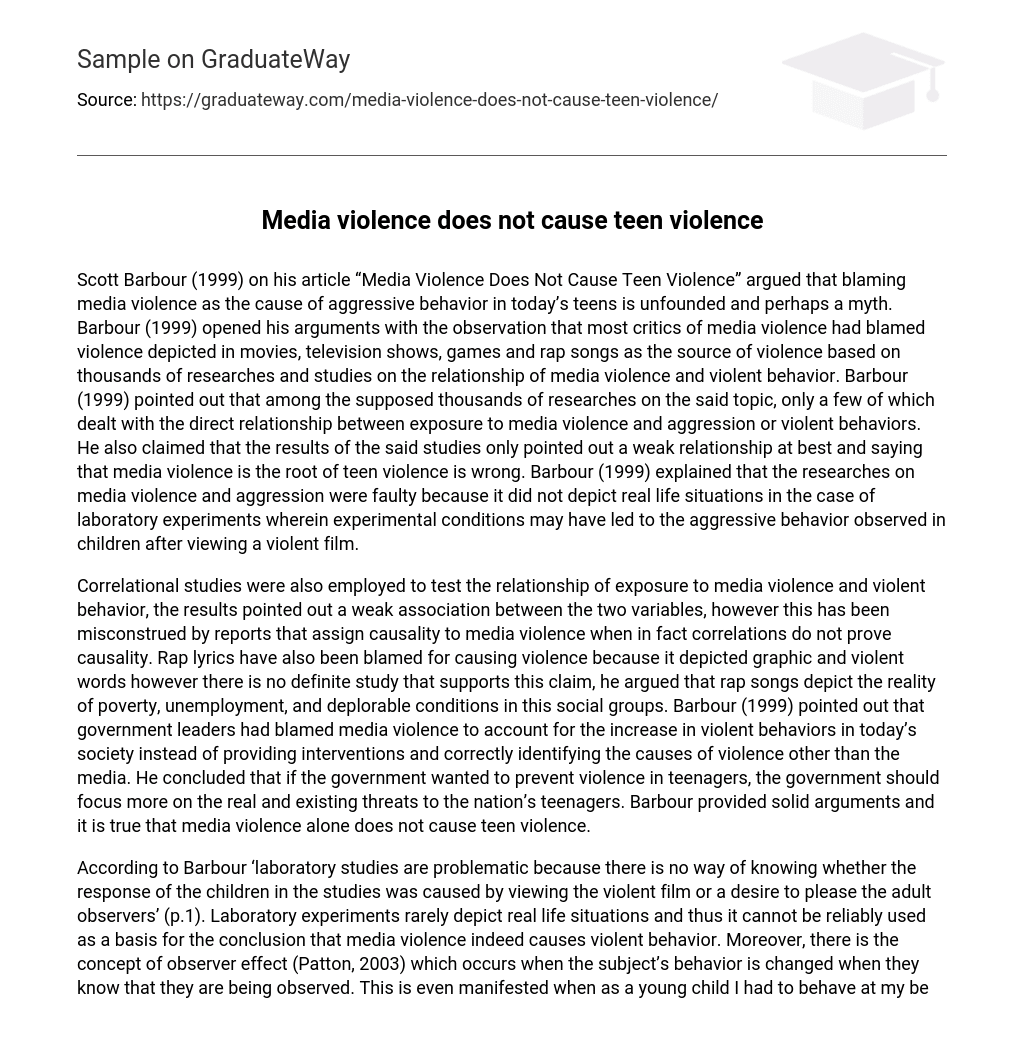Scott Barbour (1999) on his article “Media Violence Does Not Cause Teen Violence” argued that blaming media violence as the cause of aggressive behavior in today’s teens is unfounded and perhaps a myth. Barbour (1999) opened his arguments with the observation that most critics of media violence had blamed violence depicted in movies, television shows, games and rap songs as the source of violence based on thousands of researches and studies on the relationship of media violence and violent behavior. Barbour (1999) pointed out that among the supposed thousands of researches on the said topic, only a few of which dealt with the direct relationship between exposure to media violence and aggression or violent behaviors. He also claimed that the results of the said studies only pointed out a weak relationship at best and saying that media violence is the root of teen violence is wrong. Barbour (1999) explained that the researches on media violence and aggression were faulty because it did not depict real life situations in the case of laboratory experiments wherein experimental conditions may have led to the aggressive behavior observed in children after viewing a violent film.
Correlational studies were also employed to test the relationship of exposure to media violence and violent behavior, the results pointed out a weak association between the two variables, however this has been misconstrued by reports that assign causality to media violence when in fact correlations do not prove causality. Rap lyrics have also been blamed for causing violence because it depicted graphic and violent words however there is no definite study that supports this claim, he argued that rap songs depict the reality of poverty, unemployment, and deplorable conditions in this social groups. Barbour (1999) pointed out that government leaders had blamed media violence to account for the increase in violent behaviors in today’s society instead of providing interventions and correctly identifying the causes of violence other than the media. He concluded that if the government wanted to prevent violence in teenagers, the government should focus more on the real and existing threats to the nation’s teenagers. Barbour provided solid arguments and it is true that media violence alone does not cause teen violence.
According to Barbour ‘laboratory studies are problematic because there is no way of knowing whether the response of the children in the studies was caused by viewing the violent film or a desire to please the adult observers’ (p.1). Laboratory experiments rarely depict real life situations and thus it cannot be reliably used as a basis for the conclusion that media violence indeed causes violent behavior. Moreover, there is the concept of observer effect (Patton, 2003) which occurs when the subject’s behavior is changed when they know that they are being observed. This is even manifested when as a young child I had to behave at my best when I knew that my relatives were visiting and that my mother would be happy if I behaved well.
“Viewing violent television programs could easily be caused by the child’s tendency to be aggressive” argued Bourbon, (1999). It is true that television program preference could be a function of socialization, for example a cousin had a nanny who liked watching action movies, all he was exposed was violent movies which naturally made him more inclined to watch violent movies but he did not exhibit any aggressive behaviors. He however was loud and used words like “I will hit you”, “I’m gonna kill you” and the like but he never did hit or fight with anyone. Thus it would not be always totally true that watching violent television shows would make people more violent.
Babour (1999) also said that “it is a huge leap from adopting aggressive demeanors to actually believing that aggressive behaviors are acceptable” (p.2). Babour meant that it does not generally follow that when a person dresses like a gangster, talks like a gangster and listens to gangster music that he/she is a gangster. If this was the case then all who listened to dark music would have committed suicides in a daily basis.
In conclusion, media violence whether it is movies, graphic novels, violent shows and rap music does not cause teens to behave violently. Aggression and violence can be brought about by several factors among of which can be personal characteristics and social influences which our leaders should look into if they are serious about controlling violence.
References
Barbour, Scott “Media Violence Does Not Cause Teen Violence” Teen Violence. San Diego:
Greenhaven Press, 1999.
Patton, Michael Quinn “Qualitative Research and Evaluation Methods 3rd Edition” Thousand
Oaks: Sage, 2003.





